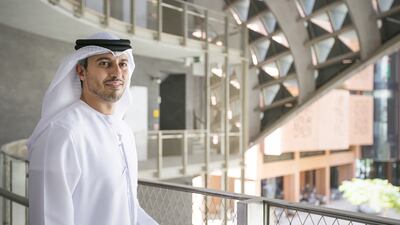To find inspiration for the future in his new role as chief executive of Masdar, Dr Ahmad Belhoul looked at the past.
“When you look back a generation or two to our grandparents’ time, they were some of the most sustainable people on Earth,” he said. “They would use water and food only to the extent that they needed.”
Appointed as the head of Abu Dhabi’s leading future energy organisation in March, Dr Belhoul plots his vision of a sustainable future through local inspiration. “We’ve reached a generation that is less cognisant of sustainability, but new leadership has come with a promise of developing sustainability in the UAE.”
Although consciousness of ecology has seemingly become a marketing gimmick, the importance of the lifestyle change cannot be understated, said Dr Belhoul, a former vice president of the industry unit at Mubadala Development Company.
“Sustainability overall as a concept is a very important matter. People say that the buzzword is sustainability but, for me, it hits home more when taken in context,” he said.
The context in this case is the importance of changing lifestyles in the UAE.
Masdar as an academic institution enrolled more than 400 students in its programme, but Dr Belhoul believes that its role as an educator does not end there.
“Developing new solar projects may not resonate with the average person, but when you tell someone about a solar plane that travels around the world, it really hits home with the reality that clean technology is coming,” he said.
The solar aircraft is the Masdar-hosted Solar Impulse challenge, in which two pilots will take off from Abu Dhabi and circumnavigate the Earth in a craft powered exclusively by solar energy.
In March, Dr Belhoul succeeded Dr Sultan Al Jaber, who will continue as Minister of State. Dr Al Jaber is also the UAE’s Special Envoy for Energy and Climate Change at the UN and the chairman of Masdar.
Dr Belhoul said sustainability projects worked on two fundamental levels: promoting the development of new technologies in exciting ways, and inspiring the population in the reality of a sustainable future.
“Part of our mandate is to develop human capital,” Dr Belhoul said. “We aren’t only judged by how many megawatts we produce but by how many leaders we produce or groom.”
He said Masdar was committed to developing local talent across its operations, and placed a strong emphasis on strengthening the UAE citizen labour force.
About 40 per cent of Masdar employees are Emiratis.
“That’s a big element,” he said. “What we have seen in past years, we’ve seen a bigger group of people with a sense of sustainability and there’s a bright future.”
Programmes such as the Young Future Energy Leaders, led by the Masdar Institute, focus on building youth experience in the sustainability sector by providing internships alongside professionals.
Formerly the chief executive of strategy and tourism for Dubai’s Department of Tourism and Commerce Marketing, Dr Belhoul is no stranger to leadership roles, but said that the true change towards a sustainable future would come from the community.
“I moved into my house four years ago but I’ve actually spoken to my director to give me insight to help me be a bit more [energy] responsible,” he said. “He told me a very simple way is to have a walk-in audit to help you make your lifestyle more sustainable.”
Dr Belhoul, who holds a PhD from Monash University in Australia, said that sustainability was a lot more widespread in lifestyles globally, but that it remained an issue that had to be dealt with at the individual level.
“On a personal level, and for everybody in the UAE, it is important to implement a self-imposed guideline in how you can have a culture [where] we actually value the resources; a way to look to the future.
“The vision remains the same, to maintain Abu Dhabi as a leading energy leader, to grow and be at the forefront of renewable energy.”
nalwasmi@thenational.ae

